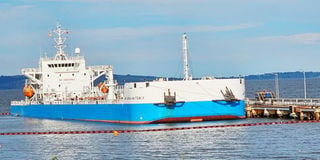The Africa Finance Corporation (AFC) is reshaping the continent’s infrastructure and renewable energy sectors with strategic investments aimed at reducing reliance on imports and boosting global competitiveness.
These efforts are driving the creation of a self-sustaining, interconnected African economy, and positioning the continent as a key player in the global energy transition.
AFC’s role in renewable energy has been particularly significant. Last year, AFC invested in Infinity Power Holdings to create the largest renewable energy platform in Africa, with more than 1.3 GW of operational wind and solar projects across South Africa, Egypt and Senegal, and a further 14 GW pipeline at various stages of development.
The platform tackles the energy deficit while avoiding 3.4 million tonnes of CO₂ emissions annually, underlining AFC’s leadership in sustainable energy.
AFC’s contribution to key renewable energy projects is transforming nations. For instance, the completion of a 60-megawatt wind farm in Djibouti in 2023 increased the country’s energy capacity by 50 percent and helped the government in its goal to become Africa’s first country entirely reliant on green power.
AFC is investing $14.1 million in the Morocco-UK Power Project as part of a development consortium, alongside other partners, to support the development and de-risking of the 10.5 GW project. This initiative aims to deliver 3.6 GW of clean energy from Morocco to the UK, supplying up to eight percent of Britain’s electricity needs.
The Corporation’s influence is equally significant in the transport infrastructure sector, crucial for supporting regional trade. One flagship project is the MetroKin rail initiative in Kinshasa, Democratic Republic of Congo (DRC). This project will revitalise 300 kilometres of railroad, starting with a key 25-kilometre stretch connecting Kinshasa’s central station to N’Djili International Airport.
AFC has committed $3 million to the development phase and serves as the Mandated Lead Arranger. Other infrastructure projects, such as the Kano-Maradi railway linking Nigeria and Niger, the Lagos-Abidjan highway, and Mahathi Infra Uganda’s port and storage terminal on Lake Victoria are vital to enhancing trade routes, improving energy transportation, and fostering regional integration.
“AFC is committed to playing a central role in Africa’s development by mobilising investments, building critical infrastructure, and ensuring that Africa’s resources benefit its people,” says Samaila Zubairu, AFC’s President and CEO.
One of AFC’s most ambitious infrastructure projects is the Lobito Corridor, which connects northwest Zambia to Angola’s Benguela rail line and the port of Lobito. This corridor facilitates the export of copper and cobalt, critical minerals for the global energy transition.
This collaboration, supported by partners like the US government, the African Development Bank, and the governments of Angola, DRC, and Zambia, showcases AFC’s capacity to unlock Africa’s vast natural resources.

Africa Finance Corporation President and CEO Samaila Zubairu.
Photo credit: AFC
These infrastructure projects align with the goals of the African Continental Free Trade Area (AfCFTA), a pact aimed at reducing trade barriers and increasing intra-African commerce by creating a single market of 1.3 billion people.
AFC’s holistic approach supports AfCFTA’s goals to boost economic integration across the continent through its investments in industrial parks, logistics, and special economic zones (SEZs), helping to streamline the export of minerals and agricultural products while enhancing intra-African trade.
Logistics and industrial infrastructure are vital for regional connectivity and economic growth. Through its majority shareholding in ARISE Integrated Industrial Platforms (IIP), AFC has helped establish SEZs aimed at adding value to Africa’s raw materials.
For example, the Nkok SEZ in Gabon has made the country one of the world’s largest exporters of wood veneers, while Benin’s Glo-Djigbé Industrial Zone (GDIZ) has attracted over $1 billion in foreign direct investment.
Similar industrial zones are under development in Côte d’Ivoire, Democratic Republic of Congo, Rwanda and Nigeria, transforming local resources like timber and agricultural products into high-value goods, thus boosting Africa’s position in global trade.
In the agricultural sector, AFC is focused on adding value to raw materials to reduce dependence on imports. A notable example is AFC’s investment via ARISE IIP in livestock parks and cold chain infrastructure in Chad, which will enable beef exports to Gabon and Angola, with plans to expand into the Gulf countries.
Value-accretive projects in Gabon’s forestry and agricultural sectors, such as cashew, sesame, and soy, are expected to spur job creation and economic growth.
AFC is committed to net-zero goals by leveraging Africa’s renewable energy resources and critical minerals to drive economic transformation.
“By processing these materials locally, Africa can contribute to global emissions reduction while driving its economic transformation,” Zubairu emphasises.
This strategy aligns with AFC’s efforts to establish uniform customs systems and visa-free travel across Africa, further promoting trade and mobility across the continent.
Through investments in energy, infrastructure, agriculture, and industrialisation, AFC is working to create a more prosperous, self-sufficient Africa, breaking the cycle of poverty and empowering the continent to realise its full potential on the global stage.
AFC: From a vision by Africa’s forefathers to a Pan-African Financial Powerhouse

Mahathi Infra Uganda port and storage terminal on Lake Victoria.
Photo credit: AFC
Founded in 2007, the corporation was established as part of a broader vision championed by African leaders, including Nigerian President Olusegun Obasanjo and South Africa’s Thabo Mbeki, to create a financial institution that could provide the capital and expertise needed to develop Africa from within.
Since its inception, AFC has grown its balance sheet from an initial $1 billion to over $12 billion. Investments spanning the power, transport, heavy industries, telecommunications, and natural resources sectors exceed $13 billion.
The AFC mission, guided by its President and CEO Samaila Zubairu, is rooted in the belief that Africa’s development must be driven and financed from within.
“We cannot rely on grants and aid to fund our development,” Zubairu says. “Instead, we need to mobilise local resources, including pension funds and insurance companies, to finance infrastructure projects that are critical to the continent’s growth.”
This philosophy has led AFC to forge strategic partnerships with local institutions. Among the notable collaborations in the East African region is with CPF Financial Services (CPF) in Kenya.
Announced last year, this partnership is focused on co-financing and developing infrastructure projects that align with Kenya’s Vision 2030, a national development roadmap aimed at transforming the country into a middle-income, industrialised economy. The AFC-CPF partnership will leverage both organisations’ expertise to co-develop projects in energy, transport, and urban infrastructure.
The partnership with CPF mirrors AFC’s successful launch of InfraCredit in Nigeria, a program designed to de-risk local currency infrastructure bonds. Through InfraCredit, AFC mobilised over NGN 200 billion, with more than half sourced from domestic pension funds.
The initiative enabled 12 first-time issuers to access local capital markets and has brought 21 infrastructure projects to financial close. AFC aims to replicate this model in Kenya, utilising the CPF collaboration to help establish a sustainable framework for financing infrastructure with local currency and thereby mitigate the risks associated with foreign currency reliance.
AFC’s priority on mobilising funds from both domestic and international sources to support development has driven partnerships with financial institutions across the continent. Last year, for example, AFC helped reduce borrowing costs by over 1,000 basis points for one African government by underwriting an issue of Japanese yen bonds, raising $500 million.
This year, AFC has raised over $1.36 billion, reflecting strong global confidence in its ability to fund critical infrastructure projects across Africa.
This includes a $1.16 billion syndicated loan from lenders across Europe, the Middle East, and Asia, with notable new participants like Société Générale, Bank Muscat, and Intesa Sanpaolo Bank Luxembourg S.A. Additionally, AFC is in the process of securing an additional facility, which is expected to be upsised by end of September 2024.
These initiatives illustrate AFC’s pragmatism and commitment in addressing the continent’s infrastructure financing gap by accessing diverse pools of capital.
AFC’s impact is felt across Africa. Projects like the Lobito Corridor in Zambia are crucial to facilitating the export of copper and cobalt—key minerals for the global energy transition.
Strategic investments in natural resources and logistics reflect AFC’s broader mission to drive Africa’s industrialisation by optimising the continent’s vast natural resources.
In this way, AFC is realising the aspirations of Africa’s founding fathers. The vision of these leaders—to see Africa rise through self-sufficiency, robust infrastructure, and economic independence—is being brought to life through AFC’s efforts to build the foundations for the continent’s industrial and economic growth.
By collaborating with regional partners and accessing new sources of capital, AFC is demonstrating that Africa’s future can be built from within, ensuring sustainable and long-lasting development.
Source link : https://www.theeastafrican.co.ke/tea/partner-content/africa-finance-corporation-infrastructure-renewables-funding-4794932
Author :
Publish date : 2024-10-15 15:43:43
Copyright for syndicated content belongs to the linked Source.





